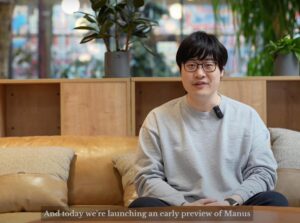Nonprofit Supported by Peter Thiel Declares the Arrival of America’s ‘DeepSeek Moment’

Sentient Launches Open Deep Search: A New Era in AI Search Technology
Overview of Sentient’s New AI Framework
Sentient, an AI development lab based in San Francisco, has made headlines by releasing Open Deep Search (ODS), an open-source AI search framework. This announcement came on a Tuesday afternoon and is positioned as a significant move in the competitive landscape of AI technology. The company, valued at $1.2 billion and backed by Peter Thiel’s Founder’s Fund, highlights ODS as a U.S. response to China’s deep learning models, particularly DeepSeek.
Benchmark Performance
Sentient’s ODS has shown impressive performance in testing, recording an accuracy of 75.3% on the FRAMES benchmark. This result is substantially above that of notable competitors, including Perplexity and OpenAI’s GPT-4o Search Preview, which achieved scores of 44.4% and 50.5%, respectively. Such a performance gap underscores Sentient’s assertion that their open-source model outperforms key players in the industry.
How ODS Works
ODS relies on Sentient’s Open Search Tool, which operates using an agentic framework to refine queries and extract context from search results. When asked about their testing methods, co-founder Himanshu Tyagi emphasized the necessity for models to integrate knowledge from various sources. This design excludes "ground truth" sources like Wikipedia, enabling a more rigorous evaluation of the model’s capabilities.
Key Features of Open Deep Search
Agentic Framework: ODS employs a self-correcting code approach, allowing it to reevaluate searches dynamically. It identifies missing information and can re-query for more accurate results.
Intelligent Query Methods: When faced with challenges, ODS can perform advanced tactics such as:
- Enhanced query rephrasing
- Multi-pass retrieval
- Reranking and intelligent chunking of information from web pages
- Public Access to Data: Users can review ODS and its evaluations through Sentient’s GitHub repository.
The Significance of Open Source AI
Sentient operates as a nonprofit organization, advocating for community ownership of AI developments rather than letting closed-source corporations control this technology. The company claims that their models challenge the prevailing dominance of closed AI systems. In a time where proprietary AI models have been favored, this move toward open-source aims to democratize access to advanced AI technologies.
The Broader Impact: America’s ‘DeepSeek Moment’
The term "DeepSeek moment" refers to a pivotal shift in the AI landscape that echoes the surprise introduced by DeepSeek earlier this year. Following the rise of DeepSeek, which disrupted the tech industry by questioning established norms, Sentient believes that it is now America’s turn to embrace similar transformational changes.
NYU Shanghai professor Bogna Konior remarked on this phenomenon, likening it to a historical moment when language was invented. Such breakthroughs in AI, according to Konior, can fundamentally reshape how humans and machines interact and communicate.
The Future of AI Development
Sentient’s release of ODS reflects a broader shift in the AI landscape where open-source models are rapidly gaining traction. By offering alternative frameworks that prioritize community benefit over corporate profit, Sentient hopes to inspire collaboration among developers and accelerate innovation in AI research.
As more entities explore the potential of open-source technology, ODS sets a new standard for how AI systems can function effectively and responsibly in a transparent environment. The public can now evaluate the potential of this new framework, marking a notable development worth following in the evolving field of artificial intelligence.






